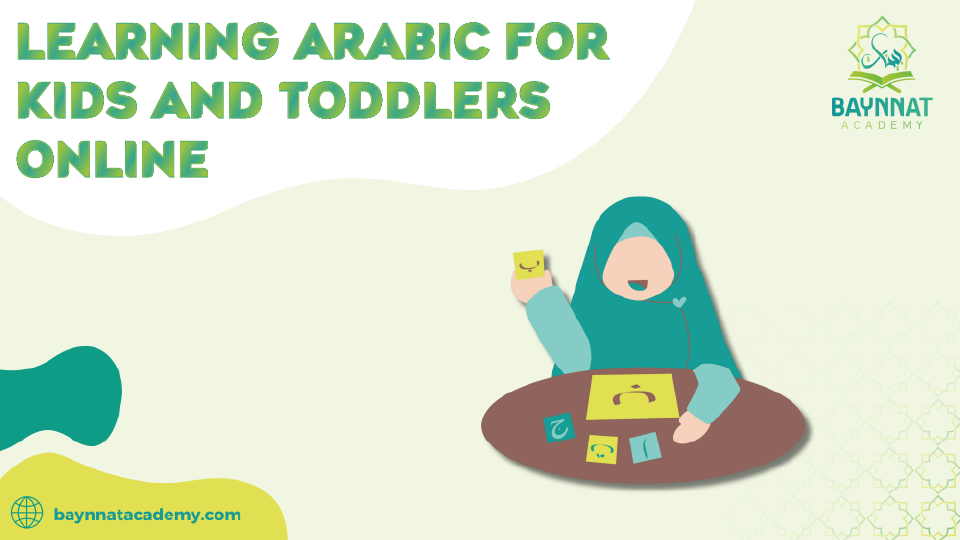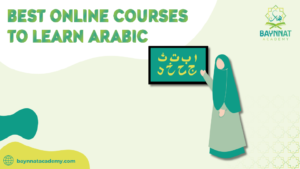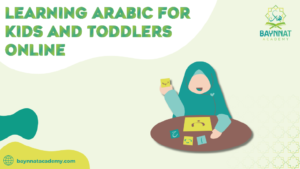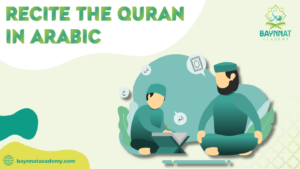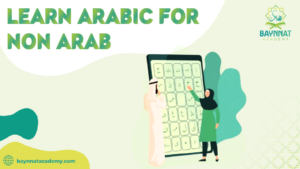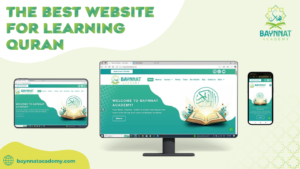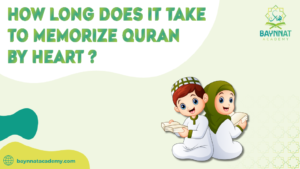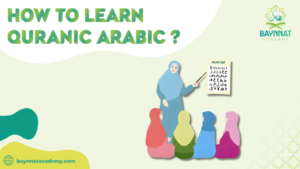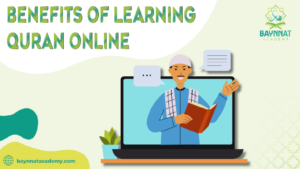Learning Arabic for kids and toddlers is important for many reasons. First of all, Arabic is a language that is widely spoken, thus learning it helps improve communication. Second, it enables kids to understand and value Middle Eastern culture and history.
Learning Arabic for kids and toddlers also leads to intriguing job prospects in fields like business, translation, and international relations when they grow up. Children who learn Arabic early on are more self-assured and ready for the global society in which they will live.
Now comes the most important aspect of learning Arabic for kids and toddlers. Children who learn Arabic from a Quranic perspective develop moral ideals and ethical behavior, which supports their development as Muslims. Additionally, it equips kids with the knowledge and respect necessary to participate in religious events right from their childhood. In this way, introducing Arabic to young children in the framework of the Quran develops their spiritual basis while also enhancing their cultural and religious identities.
Importance of learning Arabic for kids and toddlers
- Understanding the Quran.
Arabic is the language of the Quran, therefore knowing it will help children read and comprehend their holy book. For Muslim kids, learning Arabic provides a greater spiritual affinity. It enhances their spiritual engagement and creates a meaningful connection to their religious heritage by enabling them to comprehend and recite the Quran in its original language.
- Cultural Awareness.
Learning Arabic for kids and toddlers exposes them to Middle Eastern heritage and culture. Learning Arabic opens a gateway to the Middle Eastern and Arab worlds. It enables children to investigate the customs, heritage, and morals of this area, fostering a sense of cultural awareness and intercultural understanding. Children are better equipped to engage with the world with an open mind because of this early exposure to other cultures, which also teaches tolerance and respect.
- Cognitive Advantages.
Early language learning improves cognitive growth and problem-solving abilities. Hence, learning Arabic for kids and toddlers should be encouraged. Children who study Arabic frequently perform very well in areas requiring reasoning and pattern recognition.
- Great Communication Skills.
Effective Communication: Arabic is a language that is widely spoken throughout the Arab world, parts of North Africa, and Asia.
Career Possibilities: Arabic proficiency is a useful skill in a world that is becoming more linked. Many industries, including international relations, translation, business, and diplomacy, demand the language. Children who start studying Arabic early have an advantage in developing the language abilities necessary for future employment options.
- Enhancement in Skills.
Cross-cultural contact is made possible by the fact that Arabic is a widely spoken language around the world. So learning Arabic for kids and toddlers allows them to have cross-cultural experience. Kids who study Arabic are better equipped to interact with others from these cultures. This creates opportunities for foreign relationships, cross-cultural friendships, and a greater understanding of the world community.
Indeed, learning Arabic for kids and toddlers is a priceless investment in their future opportunities, cultural awareness, and intellectual development. The advantages go beyond merely improving language skills; they also help students develop into well-rounded people with a global perspective and a solid basis for their future endeavors.
Benefits of learning Arabic for kids and toddlers Online
As we explore the advantages of Arabic for kids and toddlers, it becomes evident that the virtual setting provides a conducive setting for effective and engaging instruction.
- Great Accessibility and Convenience.
Since there are no geographic restrictions for learning Arabic for kids and toddlers online, any youngster can engage in this activity. Families who live in places with limited access to Arabic language resources or people with hectic schedules who find it challenging to attend physical lessons would benefit the most from this convenience.
- Learning Arabic for kids and toddlers through online courses.
Arabic language courses for kids that are available online frequently feature interactive and interesting content. These programs make learning engaging and fun for kids by including vibrant graphics, animated characters, and gamified lessons. The retention of knowledge by children is improved when they are exposed to both visual and auditory stimuli.
Are you ready to enroll your child in the best Arabic course online? Give a try to the best Arabic course for kids now!
Bonuses and Perks: Online Arabic courses frequently provide personalized learning opportunities, enabling students to advance at their own speed. This specialized method takes into account the various learning preferences and aptitudes of the kids, making sure that none falls behind. A child’s progress is tracked through individualized feedback and assessments, which fosters a sense of achievement.
- Flexible Scheduling.
Learning Arabic for kids and toddlers provides flexible scheduling. Parents can decide which times are best for their kids to attend classes, allowing them to manage schoolwork and extracurricular activities. Families with busy schedules will particularly value this flexibility.
- Access to Expert tutors.
Numerous children’s Arabic courses offered online are taught by qualified instructors who focus on working with young students. These tutors are knowledgeable in child psychology and use effective, age-appropriate teaching strategies. As they traverse the complexities of the Arabic language, kids gain from their instructors’ instruction. Hence, online learning Arabic for kids and toddlers is indeed very useful.
- Money Saving learning.
Reduced travel costs, reasonable subscription-based learning platforms, free Arabic learning apps, and reusable digital resources are just a few of the cost-effective characteristics of online Arabic learning for kids and toddlers. It ensures value for money while imparting crucial language skills.
- Online learning Arabic for kids and toddlers ensures the Safety.
Online learning Arabic for kids and toddlers places a high priority on safety. Age-appropriate material is part of this to protect kids from objectionable information. Parental controls are frequently offered, allowing parents to keep an eye on and limit their child’s online activity. Personal data is protected by encryption and secure systems. A secure learning environment is ensured by qualified teachers. Furthermore, trustworthy websites and applications abide by privacy rules, giving parents peace of mind that their children’s online education is safe and protected.
13 ways of learning Arabic for kids and toddlers online
Let’s investigate the numerous tools and technologies that support children’s online Arabic learning. Language learning has changed thanks to online education, becoming more approachable, interesting, and participatory. These tools and technology are essential for making Arabic instruction interesting and successful for young learners:
- Interactive Language Applications.
A lot of language learning applications provide entertaining Arabic learning for kids and toddlers. Apps like Duolingo and more feature kid-specific parts. These applications offer engaging interactive lessons, tests, and challenges that aid children in learning Arabic.
- Comprehensive Arabic language classes.
Learning Arabic for kids and toddlers is available on many websites. These websites frequently include practice questions, audio-visual aids, and interactive lessons. For students of all ages, websites like Baynnat Academy offer structured training.
- YouTube Channels and videos
Numerous YouTube channels specialize in teaching Arabic to young people. These channels make learning fun by using animated characters and stories. For their kid-friendly approach, channels like “Learn with Zakaria” have become increasingly popular.
- Educational Games.
Playing games to learn a language helps kids understand Arabic. Language learning is made fun with these apps. To motivate kids, these games frequently include rewards and degrees of progression.
- Virtual Classroom Platforms.
Online learning Arabic for kids and toddlers frequently utilizes virtual classroom tools like Zoom or Google Meet. These tools enable in-person communication between teachers and students. Additionally, video conferencing allows students to see and speak with their teacher, personalizing the learning environment.
- Digital Flashcards.
Digital flashcard programs like Anki are useful resources for vocabulary development. Through repetition, visual cues, and auditory pronunciation, they aid children in memorizing Arabic words and phrases.
- Arabic e-books.
Arabic e-books and e-stories are an entertaining approach for children to practice reading and comprehension. Numerous digital Arabic storybooks suitable for different age groups are offered on many platforms.
- Online Dictionaries.
For children to search for Arabic words, comprehend their meanings, and investigate pronunciation, online Arabic dictionaries are crucial. Kids and toddlers can learn Arabic and understand it easily with handy and easy-to-use online dictionaries with voice features.
- speech recognition software.
A few platforms and apps for language learning use speech recognition technology. Kids can do this to practice speaking Arabic and get immediate feedback on their tone and pronunciation.
- Arabic language software.
Specialized children’s Arabic language programs are also available. These programs provide an interactive, age-appropriate curriculum, lessons, and exercises.
- Forums and websites.
Multilingual websites and forums, such as WordReference, are great resources for understanding sentences and phrases in context. For older children who desire to comprehend the language more deeply, they are especially helpful.
- Parental Control applications
For younger children, parental control applications can help guarantee that they only access age-appropriate and secure Arabic learning resources online. These applications are specially designed for kids to learn with safety and security.
- Augmented reality (AR) and virtual reality (VR) applications.
A few educational platforms are looking into AR and VR programs to give kids an immersive Arabic learning experience. These tools enhance the interaction and enjoyment of language learning.
Conclusion
The way of learning Arabic for kids and toddlers online has been revolutionized by technology and resources. Children can enjoy learning Arabic while obtaining useful language skills and cultural understanding thanks to the abundance of engaging applications, websites, videos, and educational activities available to them.
If you are looking to learn Arabic online for your kids and toddlers, Baynnat Academy is a place for you! There are Arabic courses online that are specifically for kids and toddlers.
You can explore them anytime and utilize two free trial classes!
